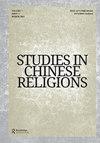Lessons from the Sanjie: merit economies as catalysts for social change
IF 0.3
3区 哲学
0 ASIAN STUDIES
引用次数: 1
Abstract
ABSTRACT When considering questions of Buddhism, business and the economy, the production and transfer of karmic merit is an often-overlooked resource, perhaps due to the unexamined assumption that merit is not, after all, ‘real.’ This essay aims to show that taking merit production seriously reveals a well-established economic model that operates alongside, and at times contrary to, systems of monetary exchange. Precisely because of the tendency to interface with money economies, networks of merit transfer can intervene in common economic practices underlying existing social conditions. For example, Xinxing (540–594), founder of the Sanjie movement, teaches that we can discharge our otherwise insurmountable karmic burden by making a single donation to the ‘Inexhaustible Storehouse.’ Donations to the Storehouse were thought to generate merit for the donors, a system already relied upon by Buddhist monasteries to raise money. However, unique to Xinxing’s Storehouse, anyone could borrow as needed, and repayment was optional. The Storehouse was so successful that it began to rival the government as a resource for social welfare, leading to its eventual disbandment. Moving from Xinxing to the present, this essay surveys other examples of merit-making rituals as drivers for charitable giving and socio-political change.三姐的经验教训:经济是社会变革的催化剂
摘要在考虑佛教、商业和经济问题时,业力功德的产生和转移是一个经常被忽视的资源,这可能是因为人们认为功德毕竟不是“真实的”本文旨在表明,认真对待功绩生产揭示了一种完善的经济模式,这种模式与货币交换制度并行,有时甚至相反。正是由于与货币经济互动的趋势,功绩转移网络可以干预现有社会条件下的常见经济实践。例如,三姐运动的创始人新兴(540–594)教导我们,通过向“不可毁灭的仓库”捐款,我们可以减轻原本无法克服的业力负担对仓库的捐赠被认为会为捐赠者带来好处,佛教寺院已经依靠这个系统来筹集资金。然而,新兴仓库独有的是,任何人都可以根据需要借款,还款是可选的。仓库非常成功,它开始作为社会福利资源与政府竞争,最终解散。从新兴走向现在,本文调查了其他作为慈善捐赠和社会政治变革驱动因素的立功仪式的例子。
本文章由计算机程序翻译,如有差异,请以英文原文为准。
求助全文
约1分钟内获得全文
求助全文
来源期刊

Studies in Chinese Religions
Arts and Humanities-Religious Studies
CiteScore
0.20
自引率
0.00%
发文量
10
 求助内容:
求助内容: 应助结果提醒方式:
应助结果提醒方式:


